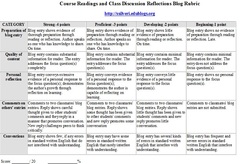Below you will find three embedded portions of NPR: Radiolab's podcast, "Morality." The fourth embedded link is the full hour of the podcast if you have the time to listen to it in its totality in one sitting.Your assignment for this last blog entry for The Road is to listen to this podcast and comment upon it in a holistic sense (listen to all 3 portions before composing your blog entry).Possible questions to start your blog post: Where does our sense of right and wrong come from? What is the relationship between morality, humanity, and the individual?
|
Blog Post Rubric
Archives
February 2023
Categories
All
|

 RSS Feed
RSS Feed